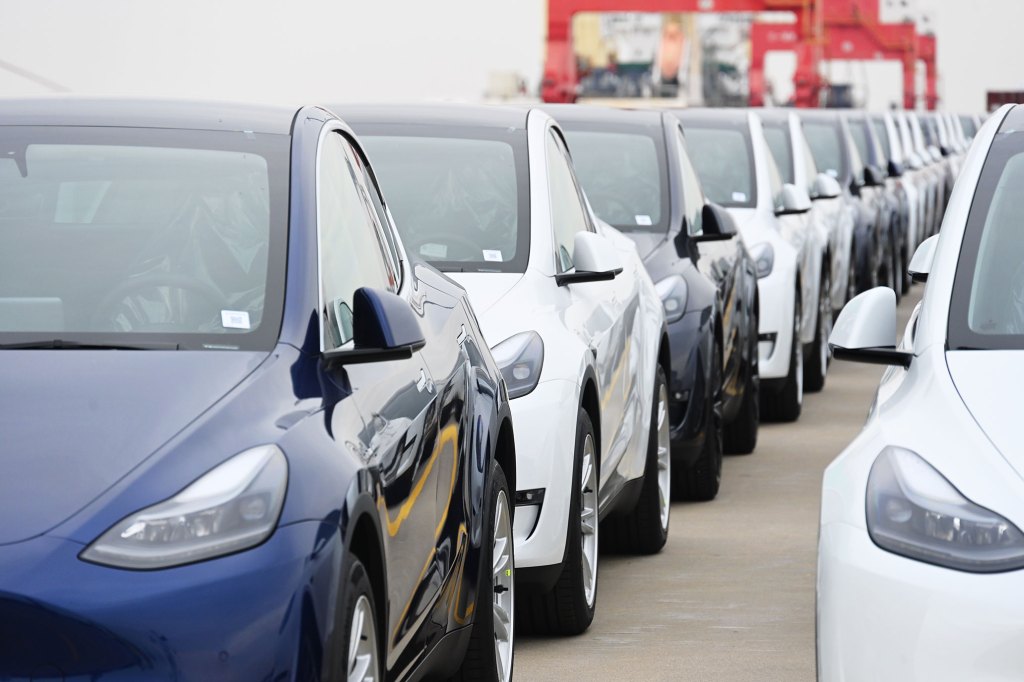Tesla has already cornered the electric vehicle market in the U.S. Now it’s calling for stricter regulations that will give it even more of an edge.
The Elon Musk–owned automaker is urging the Biden administration to adopt tougher fuel economy standards than regulators have proposed, a move that is likely to irritate legacy automakers like General Motors, Ford and Stellantis. Collectively, those three companies face a combined $10.5 billion in noncompliance fines from 2027 to 2032 under the proposed standards and have already urged regulators to ease up.
Tesla’s call on regulators to double down is another way for the company to one-up its competitors. GM, Ford and Stellantis are embroiled in a bitter union strike that has already cost them $3.45 billion and will affect their rollout of electric vehicles. And as strike costs mount, these automakers appear to be dealing with softening demand for their EVs, which are priced at a premium. Tesla’s workforce is non-unionized and it only produces electric vehicles, so the company stands to gain from both the strikes and stricter fuel standards.
And Tesla might just need the boost if it wants to continue to dominate the EV market share in the U.S. The company has been slashing its car prices to boost sales. And while Tesla delivered a record number of vehicles in the third quarter this year, its market share is down 10 points from a year ago.
In a letter to the National Highway Traffic Safety Administration (NHTSA), Tesla said the agency should finalize rules to increase the Corporate Average Fuel Economy (CAFE) standards by 6% annually for passenger cars and 8% annually for trucks and SUVs. That’s up from the NHTSA’s proposal of 2% for cars and 4% for trucks and SUVs, which would reach an average fleet fuel economy of 58 miles per gallon by 2032.
Tesla argues its own proposals would “significantly reduce energy consumption, mitigate climate change, and appropriately recognize the increasing marketplace adoption of BEV technology in both the light-duty and [heavy-duty pickup truck] sectors.” That last part is important. One of the main themes throughout Tesla’s letter to the NHTSA is that the agency doesn’t correctly consider the current and projected market penetration of EVs.
Tesla writes that numerous manufacturers — like Toyota, Hyundai, JLR and Subaru — have announced EV production goals that fall within the timeframe of the proposed standard, and highlighted the over $115 billion that automakers and battery makers have committed to expand EV and battery production in North America.
“EVs represent 9.1 percent of new light-duty vehicle sales in the second quarter of 2023,” reads the letter. “Continuing this rapid growth has led to estimates that by 2024 every third commercially newly registered car could be an electric vehicle.”
Tesla also calls NHTSA out for leaving out future vehicle models, like the Cybertruck pickup, from its modeling. The rollout of the futuristic-looking pickup truck has been long delayed, but Tesla said it expects to begin deliveries of the Cybertruck later this year. The EV maker appears to have shared with the NHTSA how many vehicles it will deliver this year and its plans for production ramp up in order. That information was redacted from the published version of the letter, but it’s clear Tesla thinks it can produce enough so that the heavy-duty pickup truck standards it suggested will by “technologically feasible” by 2024.
The NHTSA’s proposal also includes a note to reduce “off-cycle credits,” which allow automakers to earn credits for adopting technologies that improve the real-world fuel efficiency of their vehicles beyond what the CAFE standard tests measure. Things like improved air-conditioning systems and advanced engine stop-start systems that shut off the engine when the vehicle is stopped. Tesla says the NHTSA should take those things off the table entirely.
“Even if reduced, the continuing of off-cycle crediting creates asymmetry in the regulation favoring ICE vehicles, diverts research and development investment away from the best emissions reduction technology of electrification, and unnecessarily weakens the stringency of the standard,” writes Tesla.
Throughout the letter, Tesla peppered its humble brags about its own technological capabilities with reminders that its suggested fuel standards would result in better climate outcomes. And indeed, harsher fuel standards would result in fewer emissions, but only if automakers are able to adhere to those standards. If not, they’ll just be paying fines for noncompliance.
The Alliance for Automotive Innovation last month said automakers would face more than $14 billion in noncompliance penalties between 2027 and 2032 under the proposed standards. Toyota on Tuesday said those fines are proof that the standards are not technologically feasible.
Most other automakers have called the NHTSA’s proposals unreasonable and have requested revisions. They almost certainly couldn’t stomach the more radical standards Tesla is proposing.
The American Automotive Policy Council, a group that represents the Detroit Three automakers (GM, Ford and Stellantis), urged the NHTSA to halve its proposed fuel economy increases to 2% for trucks, claiming the proposal would “disproportionately impact the truck fleet.” The organization said 83% of the vehicles produced by Ford, GM and Stellantis are trucks.
Once again, Tesla would be safe here. The EV automaker began initial delivery of its electric Semi truck in December 2022, and in January announced a $3.6 billion expansion to its Nevada gigafactory in large part to scale manufacturing of the Class 8 truck.
Earlier this year, the Department of Energy also proposed to revise how it calculates petroleum-equivalent fuel economy ratings for EVs in the CAFE program, something that the Zero Emission Transportation Association, a coalition of companies advocating for 100% EV sales, has backed. Yet automakers have said that revision would devalue the fuel economy of EVs by 72%.































Comment